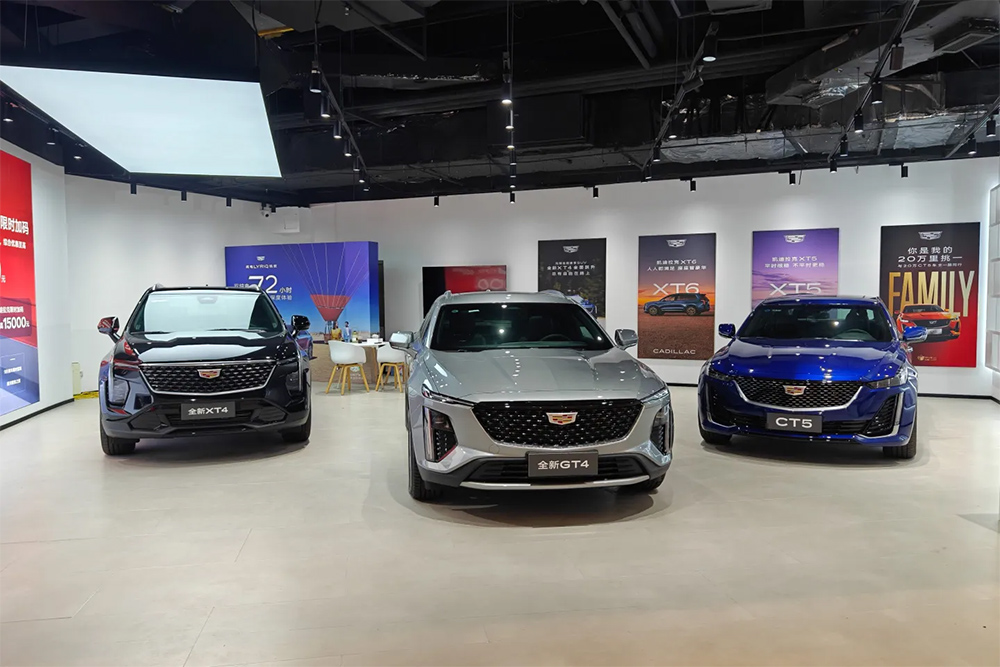
就在不久前,通用汽车可以说还是中国的一线汽车品牌。2010年,通用汽车在中国市场上的销量甚至超过了美国。此后,中国也一直是通用最重要的单一市场。2017年,通用汽车CEO玛丽·芭拉甚至表示,她完全支持中国发展电动汽车的目标,表示通用汽车将在五年内在华推出20款电动汽车。
但是自从新冠疫情以来,通用汽车在中国面临的局面却发生了重大变化。由于中国政府鼓励发展电动汽车,加之中国本土电动汽车厂商的强势崛起,导致通用汽车的市场地位遭到了削弱。
据彭博社报道,有消息人士表示,由于市场份额不断缩水,通用汽车公司正在裁减中国市场相关部门员工,其中也包括研发部门。另外,通用近期还将与本土合作伙伴上汽集团会面,可能会计划对其在华业务进行大规模结构调整。其业务重组方向可能包括发展电动汽车和推出更多高端车型。据通用汽车官网显示,通用在华共有10 家合资企业、两家外资独资企业,而且拥有超过58000名员工。
这则关于裁员和业务重组的报道也充分显示了通用汽车现在的尴尬处境。在2017年的巅峰时期,通用及其合资企业一共在中国卖出了400多万辆汽车,约占中国市场份额的14%。而当年通用在全球也只卖出了890万辆,中国市场几乎占据其半壁江山。
安全文件
通用汽车今年二季度向美国证监会提交的一份安全文件也显示,该公司正在重组在华业务,并提到了中国的电动汽车发展给该公司造成的挑战。
今年上半年,通用及其在华合资企业一共交付了大约80万辆汽车。受产能严重过剩、市场竞争激烈以及竞争对手的低价优势等因素影响,通用的合资企业今年上半年出现了2亿美元的证券亏损。
该文件指出,新能源汽车是对通用在华业务持续造成负面影响的一个重要因素。(这里的新能源汽车指的是纯电和插电式混动汽车。)通用汽车表示,为了争夺市场份额,中国本土厂商更重视产量而非利润,另外中国厂商的造车成本也显著低于外国品牌,包括通用汽车在中国的合资企业。
通用汽车于1997年首次进入中国乘用车市场,并逐渐成为与德国大众一样受欢迎的外国汽车品牌之一。正是由于在中国市场上取得了成功,通用才有底气于2017年退出欧洲市场,专攻北美和中国市场。(不过通用汽车目前正在寻求再次进入欧洲市场。)
不过,前通用汽车高管迈克尔·邓恩认为,就在通用汽车把宝押在中美两大市场后不久,中国汽车市场就“突然转向了电动汽车”。邓恩上周在他的专栏中写道,电动汽车占汽车总销量的比例,将从2020年的6%跃升到今年的将近50%。邓恩表示,外国汽车厂商一直把中国当成盈利机器,但他们却沾沾自喜、固步自封,没过多久,就被中国的变化速度吓了一跳。
“今年中国最畅销的20款电动汽车中,有18款是国产品牌。另外两款是特斯拉。”他写道。
中国消费者日益高涨的民族主义情绪,可能也是让国产品牌销量持续走高的原因之一。邓恩认为,中国品牌“突然变成了新时尚”,而与此同时,曾经一度是“洋气”象征的宝马和别克等外国品牌,现在却已经成了“昨日黄花”。(财富中文网)
译者:朴成奎
就在不久前,通用汽车可以说还是中国的一线汽车品牌。2010年,通用汽车在中国市场上的销量甚至超过了美国。此后,中国也一直是通用最重要的单一市场。2017年,通用汽车CEO玛丽·芭拉甚至表示,她完全支持中国发展电动汽车的目标,表示通用汽车将在五年内在华推出20款电动汽车。
但是自从新冠疫情以来,通用汽车在中国面临的局面却发生了重大变化。由于中国政府鼓励发展电动汽车,加之中国本土电动汽车厂商的强势崛起,导致通用汽车的市场地位遭到了削弱。
据彭博社报道,有消息人士表示,由于市场份额不断缩水,通用汽车公司正在裁减中国市场相关部门员工,其中也包括研发部门。另外,通用近期还将与本土合作伙伴上汽集团会面,可能会计划对其在华业务进行大规模结构调整。其业务重组方向可能包括发展电动汽车和推出更多高端车型。据通用汽车官网显示,通用在华共有10 家合资企业、两家外资独资企业,而且拥有超过58000名员工。
这则关于裁员和业务重组的报道也充分显示了通用汽车现在的尴尬处境。在2017年的巅峰时期,通用及其合资企业一共在中国卖出了400多万辆汽车,约占中国市场份额的14%。而当年通用在全球也只卖出了890万辆,中国市场几乎占据其半壁江山。
安全文件
通用汽车今年二季度向美国证监会提交的一份安全文件也显示,该公司正在重组在华业务,并提到了中国的电动汽车发展给该公司造成的挑战。
今年上半年,通用及其在华合资企业一共交付了大约80万辆汽车。受产能严重过剩、市场竞争激烈以及竞争对手的低价优势等因素影响,通用的合资企业今年上半年出现了2亿美元的证券亏损。
该文件指出,新能源汽车是对通用在华业务持续造成负面影响的一个重要因素。(这里的新能源汽车指的是纯电和插电式混动汽车。)通用汽车表示,为了争夺市场份额,中国本土厂商更重视产量而非利润,另外中国厂商的造车成本也显著低于外国品牌,包括通用汽车在中国的合资企业。
通用汽车于1997年首次进入中国乘用车市场,并逐渐成为与德国大众一样受欢迎的外国汽车品牌之一。正是由于在中国市场上取得了成功,通用才有底气于2017年退出欧洲市场,专攻北美和中国市场。(不过通用汽车目前正在寻求再次进入欧洲市场。)
不过,前通用汽车高管迈克尔·邓恩认为,就在通用汽车把宝押在中美两大市场后不久,中国汽车市场就“突然转向了电动汽车”。邓恩上周在他的专栏中写道,电动汽车占汽车总销量的比例,将从2020年的6%跃升到今年的将近50%。邓恩表示,外国汽车厂商一直把中国当成盈利机器,但他们却沾沾自喜、固步自封,没过多久,就被中国的变化速度吓了一跳。
“今年中国最畅销的20款电动汽车中,有18款是国产品牌。另外两款是特斯拉。”他写道。
中国消费者日益高涨的民族主义情绪,可能也是让国产品牌销量持续走高的原因之一。邓恩认为,中国品牌“突然变成了新时尚”,而与此同时,曾经一度是“洋气”象征的宝马和别克等外国品牌,现在却已经成了“昨日黄花”。(财富中文网)
译者:朴成奎
Not long ago, General Motors was arguably the top automotive brand in China. In 2010, the American automaker sold more cars in China than in the United States. Since then, China has continually been a key sales market for GM and in 2017 the company’s CEO Mary Barra even said she was fully on-board with China’s EV goals and GM would launch 20 EVs over five years in the country.
But the landscape has changed for GM since the COVID pandemic. While the pandemic affected overall automotive sales in China due to the country’s strict COVID restrictions, GM also has had to contend with the Chinese government’s shift towards encouraging EV adoption and the subsequent rise of domestic EV makers, which has eroded GM’s market position.
Now, GM’s dwindling market share is resulting in the automaker cutting staff in Chinese market-related departments—which includes research and development—according to a Bloomberg report citing people familiar with the matter. The report added GM will also be meeting with its local partner SAIC to plan a larger structural overhaul of operations in China. Part of the restructuring could involve a shift to producing EVs and a focus on more premium models. GM has 10 joint ventures, two wholly owned foreign enterprises and more than 58,000 employees in China according to its website.
The report of job cuts and a potential restructuring show how far GM has fallen from its peak in 2017. GM and its joint ventures sold 4 million vehicles in China that year, accounting for about a 14% market share in the country. The 4 million vehicles sold in China also represented almost half of GM’s 8.9 million vehicles sold globally.
Security filing
A recent security filing for GM’s second quarter results also said it was working on restructuring operations in China, and showed how China’s EV push is becoming a challenge for the Detroit-headquartered automaker.
The automaker and its China joint ventures delivered about 800,000 vehicles for the first half of this year. Its joint ventures generated an equity loss of $0.2 billion for the first six months of the year, driven by intense competition in a market with significant excess capacity and competitors offering vehicles at lower prices.
The filing listed new energy vehicles, a term use for battery electric vehicles and plug-in hybrids, as a continued negative impact to its operations in China. It said Chinese automakers are prioritizing production over profit in a bid to gain market share and added that Chinese automakers could produce vehicles at costs well below foreign automakers, including that of GM’s China joint venture.
GM first entered the Chinese passenger vehicle market in 1997 and subsequently became one of the more popular foreign brands alongside the likes of Volkswagen. Its success in the Chinese market led it to pulling out of Europe in 2017 to focus on North America and China. (GM is now looking to enter Europe again).
But that shift to focus on just two key markets came shortly before an “abrupt shift to electric vehicles” according to Michael Dunne, a former GM executive. Dunne wrote in his newsletter last week that EV share of total car sales will jump to almost 50% this year, up from just 6% in 2020. Dunne said foreign carmakers, which have seen China as a profit machine, were complacent and had been caught out by the speed of change.
“This year, eighteen of the twenty best-selling EVs are Chinese brands. The other two are Teslas,” Dunne wrote.
Rising nationalism amongst Chinese consumers could also have a part to play. Dunne argued that Chinese brands are “suddenly the new cool” and that global brands like BMW and Buick, which is owned by GM, which were once aspirational are now “so yesterday”.






